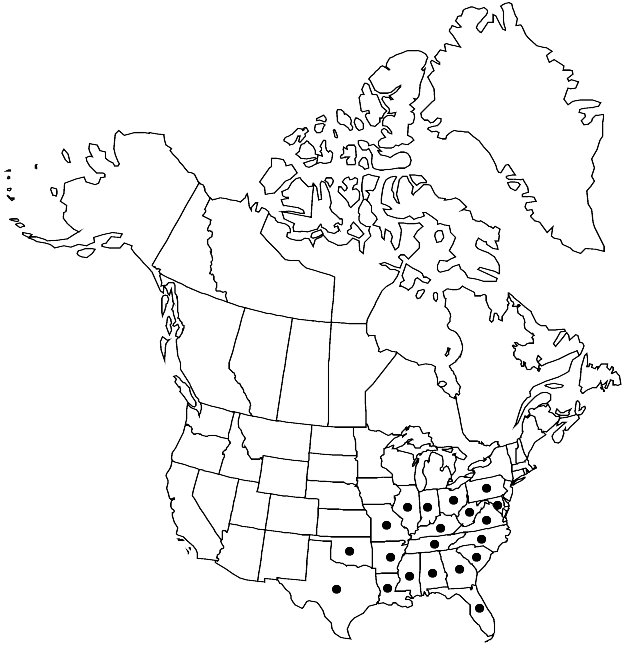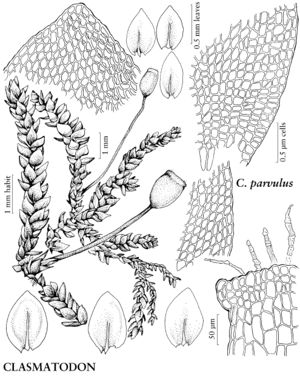Difference between revisions of "Clasmatodon parvulus"
in A. Gray, Manual ed. 2, 660. 1856.
FNA>Volume Importer |
FNA>Volume Importer |
||
| Line 32: | Line 32: | ||
|elevation=low to moderate elevations (0-400 m) | |elevation=low to moderate elevations (0-400 m) | ||
|distribution=Ala.;Ark.;Fla.;Ga.;Ill.;Ind.;Ky.;La.;Md.;Miss.;Mo.;N.C.;Ohio;Okla.;Pa.;S.C.;Tenn.;Tex.;Va.;W.Va.;Europe. | |distribution=Ala.;Ark.;Fla.;Ga.;Ill.;Ind.;Ky.;La.;Md.;Miss.;Mo.;N.C.;Ohio;Okla.;Pa.;S.C.;Tenn.;Tex.;Va.;W.Va.;Europe. | ||
| − | |discussion=<p>The inconspicuous plants of Clasmatodon parvulus form small, slender, straggly mats on tree trunks in southeastern North America north of Mexico. The species is characterized by a short costa (Leskea species have a strong costa ending near the apex), ovate, mostly bluntly acute leaves (Lindbergia has long-acuminate leaves), and a lack of erect, flagelliform branchlets (as in Platygyrium repens). The elliptic, erect capsules with a reduced peristome on short setae also are diagnostic.</p> | + | |discussion=<p>The inconspicuous plants of <i>Clasmatodon parvulus</i> form small, slender, straggly mats on tree trunks in southeastern North America north of Mexico. The species is characterized by a short costa (<i>Leskea</i> species have a strong costa ending near the apex), ovate, mostly bluntly acute leaves (<i>Lindbergia</i> has long-acuminate leaves), and a lack of erect, flagelliform branchlets (as in <i>Platygyrium repens</i>). The elliptic, erect capsules with a reduced peristome on short setae also are diagnostic.</p> |
|tables= | |tables= | ||
|references= | |references= | ||
| Line 55: | Line 55: | ||
|publication year=1856 | |publication year=1856 | ||
|special status=Selected by author to be illustrated | |special status=Selected by author to be illustrated | ||
| − | |source xml=https://jpend@bitbucket.org/aafc-mbb/fna-data-curation.git/src/ | + | |source xml=https://jpend@bitbucket.org/aafc-mbb/fna-data-curation.git/src/8f726806613d60c220dc4493de13607dd3150896/coarse_grained_fna_xml/V28/V28_675.xml |
|genus=Clasmatodon | |genus=Clasmatodon | ||
|species=Clasmatodon parvulus | |species=Clasmatodon parvulus | ||
Revision as of 17:07, 18 September 2019
Plants slender, in interwoven mats. Stems to 1(–2) cm, branches to 2(–5) mm, erect; axillary hair distal cell obtuse, pale brown. Stem leaves ± subsecund, 0.3–0.5 mm wide; laminal cells 18–30 × 8–10 µm, smooth. Seta 0.2–0.5 cm. Capsule 0.7–1 mm; annulus 3- or 4-seriate, cells small, brown; exostome teeth blunt, partially connate; endostome basal membrane inconspicuous, segments 16, short, slender, unequally 2-fid, partially fused to basal membrane. Spores finely roughened.
Habitat: Tree trunks and bases, flood plain forests, calcareous rock
Elevation: low to moderate elevations (0-400 m)
Distribution

Ala., Ark., Fla., Ga., Ill., Ind., Ky., La., Md., Miss., Mo., N.C., Ohio, Okla., Pa., S.C., Tenn., Tex., Va., W.Va., Europe.
Discussion
The inconspicuous plants of Clasmatodon parvulus form small, slender, straggly mats on tree trunks in southeastern North America north of Mexico. The species is characterized by a short costa (Leskea species have a strong costa ending near the apex), ovate, mostly bluntly acute leaves (Lindbergia has long-acuminate leaves), and a lack of erect, flagelliform branchlets (as in Platygyrium repens). The elliptic, erect capsules with a reduced peristome on short setae also are diagnostic.
Selected References
None.
